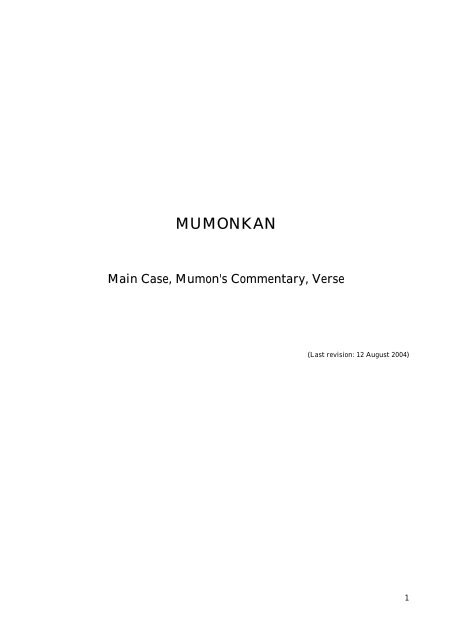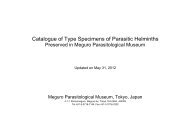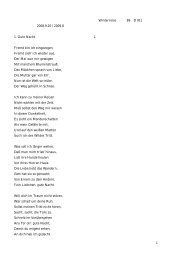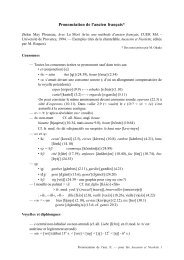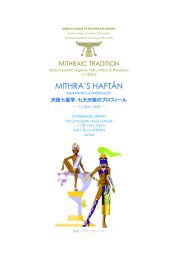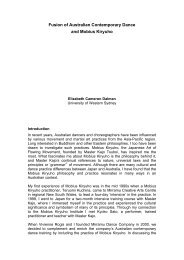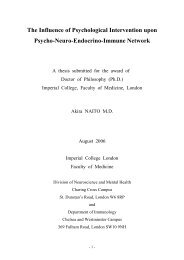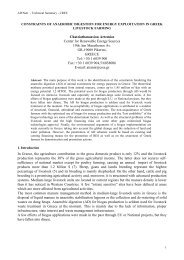MUMONKAN - nifty
MUMONKAN - nifty
MUMONKAN - nifty
Create successful ePaper yourself
Turn your PDF publications into a flip-book with our unique Google optimized e-Paper software.
<strong>MUMONKAN</strong><br />
Main Case, Mumon's Commentary, Verse<br />
(Last revision: 12 August 2004)<br />
1
Contents<br />
CASE 1: Jôshû's Dog<br />
CASE 2: Hyakujô and the Fox<br />
CASE 3: Gutei's One Finger<br />
CASE 4: The Barbarian Has No Beard<br />
CASE 5: Kyôgen's Man Up a Tree<br />
CASE 6: Buddha Holds Up a Flower<br />
CASE 7: Jôshû's "Wash Your Bowls"<br />
CASE 8: Keichû Makes Carts<br />
CASE 10: Seizei the Poor<br />
CASE 11: Jôshû Examines the Hermits<br />
CASE 12: Zuigan Calls Himself "Master"<br />
CASE 13: Tokusan Carries His Bowl<br />
CASE 14: Nansen Kills the Cat<br />
CASE 15: Tôzan's Sixty Blows<br />
CASE 16: The sound of the Bell and the Seven-Panel Robe<br />
CASE 17: The National Teacher's Three Calls<br />
CASE 18: Tôzan's Masagin<br />
CASE 19: Ordinary Mind Is the Way<br />
CASE 20: A Man of Great Strength<br />
CASE 21: Unmon's Kanshiketsu<br />
CASE 22: Kashyapa's Flagpole<br />
CASE 23: Think Neither Good Nor Evil<br />
CASE 24: Learning Speech and Silence Behind<br />
CASE 25: The Sermon of the Third Seat<br />
CASE 26: Two Monks Roll Up the Blinds<br />
CASE 27: Not Mind, Not Buddha<br />
CASE 28: Ryûtan's Name Echoed Long<br />
CASE 29: Not the Wind, Not the Flag<br />
CASE 30: Mind is Buddha<br />
CASE 31: Jôshû Sees Through an Old Woman<br />
CASE 32: A Non-Buddhist Questions Buddha<br />
CASE 33: No Mind, No Buddha<br />
CASE 34: Knowing Is Not the Way<br />
CASE 35: Seijo's Soul Is Separated<br />
CASE 36: Meeting a Man Who Has Accomplished the Way<br />
CASE 37: The Oak Tree in the Garden<br />
CASE 38: A Cow Passes Through a Window<br />
2
CASE 39: Unmon and a Mistake in Speech<br />
CASE 40: Kicking Over the Water Jug<br />
CASE 41: Bodhidharma Puts the Mind to Rest<br />
CASE 42: A Woman Comes Out of Samadhi<br />
CASE 43: Shuzan's Shippei<br />
CASE 44: Bashô's Shujô<br />
CASE 45: Who Is That One?<br />
CASE 46: Stepping Forward From the Top of a Pole<br />
CASE 47: Tosotsu's Three Barriers<br />
CASE 48: Kempô's One Way<br />
Amban's Fortyninth CASE<br />
3
CASE 1: Jôshû's Dog<br />
Case:<br />
The monk asked Jôshû in all earnestness, "Does a dog have Buddha nature or not?" Jôshû<br />
said, "Mu!"<br />
Mumon's Commentary:<br />
For the practice of Zen, you must pass the barrier set up by the ancient masters of Zen. To<br />
attain to marvelous enlightenment, you must completely extinguish all thoughts of the<br />
ordinary mind. If you have not passed the barrier and have not extinguished all thoughts,<br />
you are a phantom haunting the weeds and trees. Now just tell me, what is the barrier by<br />
the patriarchs? Merely this Mu – the one barrier of our sect. So it has come to be called<br />
"the Gateless barrier of the Zen Sect." Those who have passed the barrier are able not only<br />
to see Jôshû face to face but also to walk hand in hand with the whole descending line of<br />
patriarchs and be eyebrow to eyebrow with them. You will see with the same eye that they<br />
see with, hear with the same ear that they hear with. Wouldn't it be a wonderful joy! Isn't<br />
there anyone who wants to pass this barrier? Then concentrate your whole self into this Mu,<br />
making your whole body with its 360 bones and joints and 84,000 pores into a solid lump of<br />
doubt. Day and night, without ceasing, keep digging into it, but don't take it as<br />
"nothingness" or as "being" or "non-being". It must be like a red-hot iron ball which you<br />
have gulped down and which you try to vomit but cannot. You must extinguish all delusive<br />
thoughts and beliefs which you have cherished up to the present. After a certain period of<br />
such efforts, Mu will come to fruition, and inside and out will become one naturally. You will<br />
then be like a dumb man who has had a dream. You will know yourself and for yourself only.<br />
Then all of a sudden, Mu will break open. It will astonish the heavens and shake the earth.<br />
It will be just as if you had snatched the great sword of General Kan: If you meet a Buddha,<br />
you will kill him. If you meet a patriarch, you will kill him. Though you may stand on the<br />
brink of life and death, you will enjoy the great freedom. In the six realms and the four<br />
modes of birth, you will live in the samadhi of innocent play. Now, how should you<br />
concentrate on Mu? Exhaust every ounce of energy you have in doing it. And if you do not<br />
give up on the way, you will be enlightened the way a candle in front of the alter is lighted by<br />
one touch of fire.<br />
Verse:<br />
Dog – Buddha nature!<br />
The perfect manifestation, the absolute command.<br />
A little "has" or "has not,"<br />
And body is lost! Life is lost!<br />
4
the former Hyakujô enjoyed 500 lives of grace as a fox.<br />
Verse:<br />
Not falling, not obscuring,<br />
Two faces, one die5. Not obscuring, not falling,<br />
A thousands mistakes, ten thousand mistakes.<br />
CASE 3: Gutei's One Finger<br />
Case:<br />
Whatever he was asked about Zen, Master Gutei simply stuck up his finger.<br />
He had a boy attendant whom a visitor asked, "What kind of teaching does your master give?"<br />
The boy held up one finger too. Hearing of this, Gutei cut off the boy's finger with a knife.<br />
As the boy ran away, screaming with pain, Gutei called to him. When the boy turned his<br />
head, Gutei stuck up one finger. The boy was suddenly enlightened.<br />
When Gutei was about to die, he said to the assembled monks, "I received this one-finger Zen<br />
from Tenryû6. I've used it all my life but have not exhausted it." Having said this, he<br />
entered nirvana.<br />
Mumon's Commentary:<br />
The enlightenment of Gutei and the boy have nothing to do with the tip of a finger. If you<br />
realize this, Tenryû, Gutei, the boy, and you yourself are all run through with one skewer.<br />
Verse:<br />
Old Tenryû made a fool of Gutei,<br />
Who cut the boy with a sharp blade.<br />
The mountain deity Korei raised his hand, and lo, without effort,<br />
Great Mount Ka with its many ridges was split in two!<br />
CASE 4: The Barbarian Has No Beard<br />
5 A block of wood, plastic etc. with a different number of spots on each side, used in games (pl.: dice).<br />
6 Nothing is known about Master Tenryû except for the following mondo (questions-and-answer<br />
exchange) held between a monk and him: A monk asked, "How can I get out of the three worlds?" [In<br />
Buddhist philosophy, the three delusive worlds are those of desire, form, and no-form] Master Tenryû<br />
said, "Where are you right now?" -- Tenryû is supposed to have had Master Daibai Hôjô as his<br />
teacher.<br />
6
Case:<br />
Wakuan said, "Why has the western barbarian no beard?"<br />
Mumon's Commentary:<br />
If you practice Zen, you must actually practice it. If you become enlightened, it must be the<br />
real experience of enlightenment. You see this barbarian once face to face; then for the first<br />
time, you will be able to acknowledge him. But if you say that you see him face to face, in<br />
that instant there is division into two.<br />
Verse:<br />
In front of a fool<br />
Do not talk about dreams;<br />
The barbarian has no beard:<br />
It's adding to clarity.<br />
CASE 5: Kyôgen's Man Up a Tree<br />
Case:<br />
Master Kyôgen said, "It's like a man up the tree, hanging from a branch by his moth; his<br />
hands cannot grasp a branch, his feet won't reach a bough. Suppose there is another man<br />
under the tree who asks him, 'What is the meaning of Bodhidharma's coming from the west?'<br />
If he does not respond, he goes against the wish of the questioner. If he answers, he will lose<br />
his life. At such a time, how should he respond?"<br />
Mumon's Commentary:<br />
Even if your eloquence flows like a river, it is of no use. Even if you can expound he whole<br />
body of the sutras, it is of no avail. If you can respond to it fittingly, you will give life to<br />
those who have been dead, and put to death those who have been alive. If, however, you are<br />
unable to do this, wait for Maitreya to come and ask him.<br />
Verse:<br />
Kyôgen is really absurd,<br />
His perversity knows no bounds;<br />
He stops up the monk's mouths,<br />
Making his whole body into the glaring eyes of a demon.<br />
7
CASE 6: Buddha Holds Up a Flower<br />
Case:<br />
Once in ancient times, when the World-Honored One was at Mount Grdhrakûta7, he held up a<br />
flower, twirled it, and showed it to the assemblage. At this, they all remained silent. Only<br />
the venerable Kashyapa broke into a smile. The World-Honored One said: "I have the eye<br />
treasury of the true Dharma, the marvelous mind of nirvana, the true form of no-form, the<br />
subtle gate of the Dharma. It does not depend on letters, being specially transmitted outside<br />
all teachings. Now I entrust Mahakashyapa with this."<br />
Mumon's Commentary:<br />
The golden-faced Gautama insolently suppressed noble people and made them lowly. He<br />
sells dog's flesh under the label of sheep's head. I thought there should be something of<br />
particular merit in it. If at that time, however, all those attending had smiled, how would<br />
the eye treasury of the true Dharma have been transmitted? Or if Kashyapa had not smiled,<br />
how would he have been entrusted with it? If you say that the eye treasury of the true<br />
Dharma can be transmitted, then that is as if the golden-faced old man is swindling country<br />
people at the town gate. If you say it cannot be transmitted, then why did Buddha say he<br />
entrusted only Kashyapa with it?<br />
Verse:<br />
In handling a flower,<br />
The tail of the snake manifested itself.<br />
Kashyapa breaks into a smile,<br />
Nobody on earth or in heaven knows what to do.<br />
CASE 7: Jôshû's "Wash Your Bowls"<br />
Case:<br />
A monk asked Jôshû in all earnestness, "I have just entered this monastery. I beg you,<br />
Master, please give me instructions." Jôshû asked, "Have you eaten your rice gruel yet?"<br />
The monk answered, "Yes, I have." Jôshû said, "Then wash your bowls." The monk<br />
attained some realization.<br />
Mumon's Commentary:<br />
Jôshû, opening his mouth, showed his gall bladder and revealed his heart and liver. If the<br />
monk, hearing it, did not really grasp the fact, he would mistake a bell for a pot.<br />
7 Mt. Grdhrakûta, or Vulture Peak, where Shakyamuni Buddha preached, is located near the capital<br />
of Magada in ancient India.<br />
8
Verse:<br />
Just because it is so clear,<br />
It takes us longer to realize it.<br />
If you quickly acknowledge that the candlelight is fire,<br />
You will find that the rice has been cooked.<br />
CASE 8: Keichû Makes Carts<br />
Case:<br />
Master Gettan asked a monk, "Keichû made a hundred carts. If he took off both wheels and<br />
removed the axle, what would he make clear about the cart?"<br />
Mumon's Commentary:<br />
If you can realize this at once, your eye will be a shooting star and your spiritual activity like<br />
caching lightning.<br />
Verse:<br />
Where the active wheel revolves,<br />
Even a master fails,<br />
It moves in four directions: above and below,<br />
South and north, east and west.<br />
CASE 9: Daitsû Chishô<br />
Case:<br />
Once a monk earnestly asked Priest Jô of Kôyô, "Daitsû Chishô Buddha sat in the meditation<br />
hall for ten kalpas, but the Dharma of the Buddha did not manifest itself and he could not<br />
attain Buddhahood. Why was this?" Jô replied, "Your question is reasonable indeed."<br />
The monk said, "He sat in zazen in the meditation hall. Why did he not attain<br />
Buddhahood?" Jô replied, "Because he is a non-attained Buddha."<br />
Mumon's Commentary:<br />
I approve the old barbarian's realization, but I don't approve the old barbarian's<br />
understanding. When an ordinary person has realized it, he is a saint. If a saint<br />
understands it, he is nothing but an ordinary person.<br />
9
Verse:<br />
Far better than realizing the body is to realize the mind and be at peace.<br />
If the mind is realized, there is no anxiety about the body;<br />
If both body and mind are completely realized,<br />
A holy hermit does not wish to be appointed lord.<br />
CASE 10: Seizei the Poor<br />
Case:<br />
A monk, Seizei, eagerly asked Master Sôzan, "I am solitary and poor. I beg you Master ,<br />
please help me to become prosperous." San said, "Venerable8 Zei!" "Yes Master!" replied<br />
Zei. San said, "You have already drunk three cups of fine Hakka wine and still you say that<br />
you have not yet moistened your lips."<br />
Mumon's Commentary:<br />
Seizei is obsequious in tone but what is real intention? Sôzan has the penetrating eye and<br />
thoroughly discerns the monk's state of mind. Be that as it may, just tell me, where and how<br />
has Venerable Zei drunk the wine?<br />
Verse:<br />
Poor like Hantan,<br />
Of a spirit like Kôu,<br />
Though they cannot sustain themselves<br />
They dare to compete with each other for wealth.<br />
CASE 11: Jôshû Examines the Hermits<br />
Case:<br />
Jôshû went to a hermit's hut and asked, "Anybody in? Anybody in?" The hermit thrust up<br />
his fist. Jôshû said, "The water is too shallow for a ship to anchor." Thereupon he left.<br />
Again he went to a hermit's hut and asked, "Anybody in? Anybody in?" The hermit, too,<br />
thrust up his fist. Jôshû said, "Freely you give, freely you take away. Freely you kill, freely<br />
you give life." He made a profound bow.<br />
Mumon's Commentary:<br />
8 "Venerable" is used here to translate shari (ajari in full form, Acarya in Sanskrit), an honorific title<br />
for a monk who leads disciples, correcting their manners and deeds.<br />
10
Each hermit thrust up his fist the same way. Why is one accepted and the other rejected?<br />
Tell me, what is the cause of the confusion? If on this point you say a turning word, then you<br />
can see that Jôshû's tongue has no bone. Now he raises up, now he thrusts up in perfect<br />
freedom. But though this is so, it is also true that Jôshû himself has been seen through by<br />
the two hermit's. Furthermore, if you can say that there is a distinction of superiority and<br />
inferiority between the two hermits, you have not yet the eye of realization. Neither have<br />
you the eye of realization if you say there is no distinction of superiority and inferiority<br />
between them.<br />
Verse:<br />
His eye is a shooting star,<br />
His activity like lightning;<br />
A sword that kills man,<br />
A sword that gives man life.<br />
CASE 12: Zuigan Calls Himself "Master"<br />
Case:<br />
Every day Master Zuigan used to call to himself, "Master!" and would answer, "Yes!" Again,<br />
he would call, "Thoroughly awake! Thoroughly awake!" and he would answer, "Yes! Yes!"<br />
"Don't be deceived by others, any day or any time." "No! No!"<br />
Mumon's Commentary:<br />
Old Zuigan himself buys and sells. He has many puppet gods and devils witch he plays.<br />
But why? Look! One is calling. One is answering. One keeps awake. One is not deceived<br />
by others. But if you get stuck there, that's not it. If you were to imitate Zuigan, it would<br />
be the understanding of a fox.<br />
Verse:<br />
The reason those who learn the Way don't realize the truth<br />
Is simply that they perceive the discriminating consciousness they've had all along.<br />
It is the origin of endless life and death;<br />
Fools take it for the essential self.<br />
CASE 13: Tokusan Carries His Bowl<br />
Case:<br />
11
One day Tokusan came down to the hall carrying his bowls. Seppô asked him, "Old Master,<br />
the bell has not yet rung nor the drum sounded. Where are you going with your bowls?"<br />
Tokusan immediately went back to his room. Seppô told this to Gantô. Gantô said, "Great<br />
Tokusan though he is, he has not yet realized the last word." Hearing of this, Tokusan sent<br />
his attendant to summon Gantô and then asked him, "Don't you approve of this old monk?"<br />
Gantô secretly whispered his intention. Tokusan remained silent. Sure enough, the next<br />
day when Tokusan ascended the rostrum, his talk was quite different from usual. Gantô<br />
went to the front of the Zen hall and rubbing his hands together, laughed loudly and said,<br />
"Wonderful! How happy I am that our Old Man has realized the last word. From now on<br />
he'll be subject to no one on earth."<br />
Mumon's Commentary:<br />
As for the last word, neither Gantô nor Tokusan have ever heard it, even in a dream. When I<br />
examine this point, I find they are just puppets on a shelf.<br />
Verse:<br />
If you grasp the first word,<br />
You will realize the last word.<br />
The last word and the first word,<br />
These are not one word.<br />
CASE 14: Nansen Kills the Cat<br />
Case:<br />
Once the monk of the eastern and western Zen halls in Master Nansen's temple were<br />
quarrelling about a cat. Nansen held up the cat and said, "You monks! If one of you can<br />
say a word, I will spare the cat. If you can't say anything, I will put it to the sword." No<br />
one could answer, so Nansen finally slew it.<br />
In the evening when Jôshû returned, Nansen told him what had happened. Jôshû<br />
thereupon took off his sandals, put them on his head, and walked off. Nansen said, "If you<br />
had been there, I could have spared the cat."<br />
Mumon's Commentary:<br />
What is the meaning of Jôshû's putting his sandals on his head? If you can give a turning<br />
word concerning this matter, you will be able to see that Nansen's command was not<br />
meaningless. But if you can't look out! Danger!<br />
Verse:<br />
12
Had Jôshû been there,<br />
He would have given the command instead;<br />
Had he snatched away the sword,<br />
Even Nansen would have begged for his life.<br />
CASE 15: Tôzan's Sixty Blows<br />
Case:<br />
When Tôzan came to Unmon for instruction, Unmon asked, "Where have you come from?"<br />
Tôzan said, "From Sado." Unmon said, "Where were you during the summer retreat?"<br />
Tôzan said, "At Hôzu Monastery, south of the lake." Unmon said, "When did you leave<br />
there?" Tôzan said, "On the twenty-fifth of August." Unmon said, "I spare you sixty<br />
blows."<br />
The next day Tôzan came up to Unmon and asked, "Yesterday you spared me sixty blows<br />
though I deserved them. I beg you, sir, where was I at fault?" Unmon said, "Oh, you rice<br />
bag! Have you been wandering about like that, now west of the river, now south of the<br />
lake?" At this, Tôzan had great realization.<br />
Mumon's Commentary:<br />
At that time, if Unmon had given Tôzan the essential food of Zen and awakened him to an<br />
active Zen spirit, his family gate would not have become so desolate. Tôzan struggled with<br />
himself in agony all through the night and at daybreak came to Unmon again. Unmon gave<br />
him a further push to break through. Although Tôzan attained realization immediately, he<br />
still could not be called bright. Now I ask you, does Tôzan deserve sixty blows with the stick<br />
or not? If you say he does, then all the trees, grasses, thickets, and groves should be beaten.<br />
If you say he does not, then Unmon is telling a lie. If you grasp this clearly, you are<br />
breathing through one mouth with Tôzan.<br />
Verse:<br />
The lion has a puzzling way of teaching its cubs:<br />
The cubs crouch, leap and spring back swiftly;<br />
Unintentionally, he gave a checkmate again,<br />
The first arrow was light, but the second went deep.<br />
CASE 16: The sound of the Bell and the Seven-Panel Robe<br />
Case:<br />
13
Unmon said, "The world is vast and wide like this. Why do we put on our seven-panel robe<br />
at the sound of the bell?"<br />
Mumon's Commentary:<br />
Generally speaking, in practicing and studying Zen, it is most detestable to follow sounds and<br />
pursue colors. Even though you may become enlightened through hearing sounds and come<br />
to realize mind by seeing colors, that is the ordinary way of things. People do not know that<br />
for real Zen monks, when they are riding on sounds and becoming one with colors, everything<br />
is clear, moment by moment, everything is full of wonder, action after action. When you<br />
hear a sound, however, just tell me, does the sound come to the ear or the ear go to the sound?<br />
Even though you have extinguished both sound and silence, what will you realize here? If<br />
you hear with the ear, you cannot realize it. When you hear with the eye, for the first time it<br />
will become intimate.<br />
Verse:<br />
With realization, all things are of one family<br />
Without realization, everything is separate and different;<br />
Without realization, all things are of one family<br />
With realization, everything is separate and different.<br />
CASE 17: The National Teacher's Three Calls<br />
Case:<br />
The national teacher called his attendant three times, and three times his attendant<br />
responded. The national teacher said, "I thought I was standing alone with my back to you,<br />
but now I find that you are standing alone with your back to me."<br />
Mumon's Commentary:<br />
The national teacher called three times and his tongue dropped to the ground. The<br />
attendant responded three times, emitting the answer with light. The national teacher was<br />
old and lonely. He held the cow's head and forced it to eat grass. The attendant would have<br />
none of it; delicious food has little attraction for a man who has had enough to eat. Just tell<br />
me, where are they standing alone with their backs to each other? When the country is<br />
prosperous, persons of talent are esteemed; children of rich families are proud to eat plain<br />
food.<br />
Verse:<br />
We must carry an iron yoke with no hole,<br />
14
It is a slight matter, the curse is passed on to our descendants;<br />
If you want to support the gate and sustain the house,<br />
You must climb a mountain of swords with bare feet.<br />
CASE 18: Tôzan's Masagin<br />
Case:<br />
A monk asked Master Tôzan in all earnestness, "What is Buddha?" Tôzan said, "Masagin!<br />
(Three pounds of flax!)"<br />
Mumon's Commentary:<br />
Old Tôzan realized a bit of clam Zen. Slightly opening the two halves of the shell, he<br />
exposed his liver and intestines. This may be so, but tell me, where do you see Tôzan?<br />
Verse:<br />
Masagin juts forth!<br />
Words are intimate and the mind is even more intimate.<br />
He who speaks about right and wrong<br />
Is a man of right and wrong.<br />
CASE 19: Ordinary Mind Is the Way<br />
Case:<br />
Jôshû earnestly asked Nansen, "What is the Way?" Nansen answered, "The ordinary mind<br />
is the Way." Jôshû asked, "Should I direct myself toward it or not?" Nansen said, "If you<br />
try to turn toward it, you go against it." If I do not try to turn toward it, how can I know that<br />
it is the Way?" Nansen answered, "The Way does not belong to knowing or not-knowing.<br />
Knowing is delusion; not-knowing is a blank consciousness. When you have really reached<br />
the true Way beyond all doubt, you will find it as vast and boundless as the great empty<br />
firmament. How can it be talked about on a level of right and wrong?" At these words,<br />
Jôshû was suddenly enlightened.<br />
Mumon's Commentary:<br />
Nansen was asked a question by Jôshû, and Nansen's base was shattered and melted away.<br />
He could not justify himself. Even though Jôshû has come to realization, he will have to<br />
delve into it for another thirty years before he can realize it fully.<br />
15
Verse:<br />
The spring flowers, the moon in autumn,<br />
The cool breezes of summer, the winter's snow;<br />
If idle concerns do not cloud the mind,<br />
This is man's happiest reason.<br />
CASE 20: A Man of Great Strength<br />
Case:<br />
Master Shôgen said, "Why is it that a man of great strength does not lift up his leg?" He also<br />
said, "It is not with the tongue that we speak."<br />
Mumon's Commentary:<br />
It should be said that Shôgen poured out all that he had in his intestines and belly. But<br />
there is nobody who can recognize this. However, even someone who realized this<br />
immediately would be given a bitter blow by me. Why? Look! If you want to know<br />
whether it is pure gold or not, you must look at it in the midst of fire.<br />
Verse:<br />
Raising a leg, I upturn the Scented Ocean;<br />
Lowering my head, I look down on the dhyana heavens.<br />
There is no place to put this whole body,<br />
Please finish this poem in your own words.<br />
CASE 21: Unmon's Kanshiketsu<br />
Case:<br />
A monk asked Unmon in all earnestness, "What is Buddha?" Unmon said, "Kanshiketsu! (a<br />
dried shit-stick)"<br />
Mumon's Commentary:<br />
It should be said of Unmon that he was too poor to prepare even the plainest food and too<br />
busy to write a draft. Suddenly he took up the shit-stick to support the gate (of Buddhism).<br />
You can see how the Dharma has decayed.<br />
Verse:<br />
Lightning flashing,<br />
16
Sparks shooting from a flint;<br />
A moment's blinking-<br />
It's already missed.<br />
CASE 22: Kashyapa's Flagpole<br />
Case9: Ananda asked Kashyapa in all earnestness, "The world-Honored One transmitted the<br />
brocade robe to you. What else did he transmit to you?" Kashyapa called, "Ananda!"<br />
Ananda replied, "Yes, Master." Kashyapa said, "Knock down the flagpole at the gate."<br />
Mumon's Commentary:<br />
If you can give a turning word befitting this, you will see that the meeting at Mount<br />
Grdhrakûta is definitely still in session. If not, it is because Vipashyin Buddha has keeping<br />
something in mind from the remotest times, and even now he still cannot attain the mystery.<br />
Verse:<br />
The answer is more familiar than the question;<br />
How many discuss this with glaring eyes!<br />
Elder brother calls, younger brother answers - the family disgrace!<br />
Here is the spring that belongs to neither yin nor yang.<br />
CASE 23: Think Neither Good Nor Evil<br />
Case:<br />
The sixth patriarch was once pursued by the monk Myô as far as Mount Daiyu. The<br />
patriarch, seeing Myô coming, laid the robe and bowl on a rock and said, "This robe<br />
represents the faith. How can it be competed for by force? I will allow you to take it away."<br />
Myô tried to lift it up, but it was as immovable as a mountain. Terrified and trembling with<br />
awe, he said, "I came for the Dharma, not the robe. I beg you, lay brother, please reveal it to<br />
me." The patriarch said, "[At the very moment you were chasing after me] without thinking<br />
good or evil, what was the primal face of Monk Myô?" In that instant, Myô suddenly<br />
attained deep realization, and his whole body was covered with sweat. In tears, he bowed<br />
and said, "Besides the secret words and secret meaning you have just revealed to me, is there<br />
anything else deeper yet?" The patriarch said, "What I have preached to you is no secret at<br />
9 This is the story of Dharma transmission from Kashyapa, the first Patriarch, to Ananda, the second<br />
Patriarch.<br />
17
all. If you reflect on your own true face, the secret will be found within yourself." Myô said,<br />
"Though I have been at Ôbai with the other monks, I have never realized what my true self is.<br />
Now, thanks to your instruction, I know it is like a man who drinks water and knows for<br />
himself whether it is cold or warm. Now you, lay brother, are my master." The patriarch<br />
said, "If that is the way you feel, let us both have Ôbai for our master. Be mindful and hold<br />
fast to what you have realized."<br />
Mumon's Commentary:<br />
It should be said of the sixth patriarch that his action sprang from urgent circumstances. His<br />
kindness is like that of a grandmother who peels a fresh litchi, removes the seed, and puts it<br />
into your mouth so that all you have to do is swallow it.<br />
Verse:<br />
It can't be described! It can't be pictured!<br />
It can't be sufficiently praised! Stop trying to grasp it with your head!<br />
There is nowhere to hide the primal face;<br />
Even when the world is destroyed, it is indestructible.<br />
CASE 24: Learning Speech and Silence Behind<br />
Case:<br />
A monk asked Fuketsu in all earnestness, "Both speech and silence are concerned with ri and<br />
mi. How can we transcend them?" Fuketsu said, "I am constantly think of Kônan in march,<br />
where partridges are chirping among hundreds of fragrant blossoms."<br />
Mumon's Commentary:<br />
Fuketsu's activity of mind is like lightening. He gains the road and immediately walks<br />
along. But why does he rest upon the tip of the ancient one's tongue and not cut off? If you<br />
realize this deeply, a way will be found naturally. Just leave all words behind and say one<br />
phrase.<br />
Verse:<br />
Fuketsu does not speak in his usual style;<br />
Before he says anything, it is already manifested.<br />
If you go chattering glibly,<br />
You should be ashamed of yourself.<br />
18
CASE 25: The Sermon of the Third Seat<br />
Case:<br />
Master Kyôzan went to Maitreya's abode in a dream and was led to the third seat. A<br />
venerable monk struck the anvil with a gavel and said, "Today the third seat is due to speak."<br />
Kyôzan stood up, struck the stand with the gavel, and said, "The Dharma of Mahayana is<br />
beyond the four propositions and transcends the hundred negations. Listen! Listen!<br />
Mumon's Commentary:<br />
Just say, did he preach or did he not? If you open your mouth, you miss. If you shut your<br />
mouth, you miss too. Even if you neither open nor shut your mouth, it is a hundred and<br />
eight thousand miles away.<br />
Verse:<br />
The broad daylight, the blue sky -<br />
He speaks of a dream in a dream;<br />
Suspicious! Suspicious!<br />
He is trying to deceive the whole assembly.<br />
CASE 26: Two Monks Roll Up the Blinds<br />
Case:<br />
A monk once went to Daihôgen of Seiryô before the midday meal to ask for instruction.<br />
Hôgen pointed to the bamboo blinds with his hand. At that moment, two monks who were<br />
there went over to the blinds and rolled them up in the same manner. Hôgen said, "One has<br />
gained, one has lost."<br />
Mumon's Commentary:<br />
Just tell me, which one has gained and which one has lost? If you have one eye opened<br />
concerning this point, you will know where National Teacher Seiryô failed. Nevertheless,<br />
you should not inquire into this problem in connection with gain or loss.<br />
Verse:<br />
The blind being rolled up, bright clarity penetrates the great empty space.<br />
Yet the great empty space still does not match the principle of our sect;<br />
It is far better to throw away emptiness and everything completely,<br />
And with a tight fit, never to let the wind pass through.<br />
19
CASE 27: Not Mind, Not Buddha<br />
Case:<br />
A monk asked Nansen in all earnestness, "Is there any Dharma that has not been preached to<br />
the people?" Nansen said, "There is." The monk said, "What is the Dharma which has never<br />
been preached to the people?" Nansen said, "This is not mind; This is not Buddha; this is<br />
not a thing."<br />
Mumon's Commentary:<br />
Nansen was merely asked a question, and he exhausted all his possessions at once and went<br />
reduced to nothing.<br />
Verse:<br />
Speaking too much degrades virtue,<br />
No words are truly effective;<br />
Even though the great ocean should change,<br />
It can never be communicated to you.<br />
CASE 28: Ryûtan's Name Echoed Long<br />
Case:<br />
One day Tokusan kept asking Ryûtan for instruction till nightfall. Ryûtan finally said, "The<br />
night is late. Why don't you go to bed." Tokusan thanked him, made his bows, raised the<br />
door curtain and left. Seeing how dark the night was, he turned back and said, "It's pitch<br />
black outside." Ryûtan lit a lantern and handed it to Tokusan. Just as Tokusan reached for<br />
it, Ryûtan blew it out. At that Tokusan came to sudden realization and made a deep bow.<br />
Ryûtan asked, "What have you realized?" Tokusan replied, "From now on, I will not doubt<br />
the words of the old master who is renowned everywhere under the sun."<br />
The following day Ryûtan ascended the rostrum and declared, "There is a man among you<br />
whose fangs are like trees of swords and whose mouth is like a bowl of blood. Strike him and<br />
he won't turn his head. Someday he will settle on the top of an isolated peak and establish<br />
my Way there."<br />
Tokusan brought his sutra commentaries and notes to the front of the hall, held up a torch<br />
and said, "Even if you have exhausted abstruse doctrine, it is like placing a hair in vast space.<br />
Even if you have learned the vital points of all the truths in the world, it is like a drop of<br />
water thrown into a big ravine." He then burned all his commentaries and notes. After<br />
making his bows, he left.<br />
20
Mumon's Commentary:<br />
Before Tokusan had crossed the border, his mind was full of resentment and his mouth<br />
speechless with anger. He wanted to go the way south, intending to refute the doctrine of<br />
the special transmission outside the sutras.<br />
When he got to the road to the province of Rei, he asked an old woman if he could buy a tenjin<br />
from her. The old woman said, "Your Reverence, what are all those books you are carrying in<br />
the cart?" Tokusan said, "Those are commentaries on the Diamond Sutra." The old woman,<br />
"In that sutra, it says the past mind can't be caught; the present mind can't be caught; the<br />
future mind can't be caught. Your Reverence, with which mind are you going to take the<br />
tenjin?" This one question tightly shuts Tokusan's mouth, but hearing the old woman's<br />
words, he still did not completely die away. He asked her, "Is there a Zen master near here?"<br />
She replied, "Master Ryûtan lives about five ri away."<br />
After Tokusan arrived at Ryûtan's, he was entirely defeated. It must be said that his former<br />
and latter words are not consistent. It seems that Ryûtan, forgetting his own unsightliness,<br />
took to much pity on Tokusan. Seeing a live charcoal in Tokusan, he immediately threw<br />
muddy water over his head to extinguish it. Looking at the whole affair coolly, I think it is<br />
just a farce.<br />
Verse:<br />
Seeing the face is better than hearing the name;<br />
Hearing the name is better than seeing the face.<br />
Even though he saved his nose,<br />
Alas, he lost his eyes!<br />
CASE 29: Not the Wind, Not the Flag<br />
Case:<br />
The wind was flapping a temple flag, and two were having an argument about it. One said,<br />
"The flag is moving." The other said, "The wind is moving." They argued back and forth<br />
but could not reach the truth. The sixth patriarch said, "It is not the wind that moves. It is<br />
not the flag that moves. It is your mind that moves." The two monks were stuck with awe.<br />
Mumon's Commentary:<br />
It is not the wind that moves; it is not the flag that moves; it is not the mind that moves.<br />
Where do you see the essence of the patriarch? If you have a close grasp of the matter, you<br />
will see how the two monks, intending to buy iron, got gold, and that the patriarch<br />
impatiently said a failure on the spot.<br />
21
Verse:<br />
The wind moves, the flag moves, the mind moves;<br />
All have missed it.<br />
They only know how to open their mouths,<br />
And do not know that their words have failed.<br />
CASE 30: Mind is Buddha<br />
Case:<br />
Daibai asked Baso in all earnestness, "What is the Buddha?" Baso answered, "The very<br />
mind is Buddha."<br />
Mumon's Commentary:<br />
If you grasp it on the spot, you wear Buddha's clothes, eat Buddha's food, speak Buddha's<br />
words, do Buddha's deeds; you are Buddha himself. Though this may be so, Daibai has, alas,<br />
misled not a few people into mistaking the mark on the balance for the weight itself. How<br />
can he realize that even the mere mention of the word "Buddha" should make a man someone<br />
say, "The very mind is Buddha," he will cover his ears and run away.<br />
Verse:<br />
The blue sky, the bright day.<br />
It is most detestable to hunt around;<br />
If, furthermore, you ask, "What is Buddha?"<br />
It is like shouting your innocence while holding the loot.<br />
CASE 31: Jôshû Sees Through an Old Woman<br />
Case:<br />
A monk once asked an old woman, "What is the way to Taizan?" The old woman said, "Go<br />
straight on." After the monk had gone a few steps, she said, "This good, honest priest goes<br />
off that way, too."<br />
Later a monk told Jôshû about this. Jôshû said, "Wait a bit. I will go and see through the<br />
old woman for you." The next day he went and asked the same question, and the old woman<br />
also made the same reply. On returning, Jôshû said to his disciples, "I have seen through<br />
the old woman of Taizan for you."<br />
22
Mumon's Commentary:<br />
The old woman just sits in her tent and knows how to plan the strategy, but she still doesn't<br />
know how to capture the bandit. Old Jôshû was clever enough to steal into the camp and<br />
menace the fortress, but he hasn't the air of a magnanimous man. Pondering the matter, we<br />
must say they both had their faults. Tell me now, what insight did Jôshû get into the old<br />
woman?<br />
Verse:<br />
The question is the same,<br />
The answer is the same, too.<br />
Sand in the rice,<br />
Thorns in the mud.<br />
CASE 32: A Non-Buddhist Questions Buddha<br />
Case:<br />
A non-Buddhist in all earnestness asked the World-Honored One, "I do not ask about words, I<br />
do not ask about no-words." The World-Honored One just sat still. The non-Buddhist<br />
praised him, saying, "The world-Honored One in his benevolence and great mercy has opened<br />
the clouds of my delusion and enable me to enter the Way." Then, bowing, he took his leave.<br />
Ananda asked Buddha, "What did the non-Buddhist realize that made him praise you so<br />
much?" The World-Honored One replied, "He is just a fine horse that runs even at the<br />
shadow of a whip."<br />
Mumon's Commentary:<br />
Ananda is Buddha's disciple, but his realization is less than the non-Buddhist's. Now tell<br />
me, how far is the distance between the non-Buddhist and Buddha's disciple?<br />
Verse:<br />
Walking on the edge of a sword,<br />
Running over a ridge of jagged ice;<br />
Not using steps or ladders,<br />
Jumping from the cliff with hands free.<br />
CASE 33: No Mind, No Buddha<br />
Case:<br />
23
A monk asked Baso in all earnestness, "What is Buddha?" Baso replied, "No mind, no<br />
Buddha."<br />
Mumon's Commentary:<br />
If you can see into what was said here, your study is at an end.<br />
Verse:<br />
If you meet a swordsman, you may present a sword;<br />
You should not offer a poem unless you meet a poet.<br />
When you speak to others, say only three-quarters of it;<br />
You should never give the remaining part.<br />
CASE 34: Knowing Is Not the Way<br />
Case:<br />
Nansen said, "Mind is not Buddha; knowing is not the Way."<br />
Mumon's Commentary:<br />
It should be said of Nansen that he has grown old and knows no shame. Just opening his<br />
stinking mouth he exposed the disgrace of his own household. There are very few, however,<br />
who are grateful for his kindness.<br />
Verse:<br />
When the sky clears, the sun appears;<br />
When the rain falls, the earth is wet.<br />
With all his heart, he has preached everything,<br />
But I fear nobody can believe it.<br />
CASE 35: Seijo's Soul Is Separated<br />
Case:<br />
Goso asked a monk, "Seijo and her soul are separated; which one is the true Seijo?"<br />
Mumon's Commentary:<br />
If you realize the true one in this, you will understand that getting out of one shell and<br />
entering another is just like a traveler staying at an inn; if you have not realized it, don't rush<br />
about wildly. When earth, water, fire, and wind are suddenly about to decompose, you will<br />
24
e like a crab which has fallen into boiling water and its seven arms and eight legs. At that<br />
time, don't say I didn't warn you.<br />
Verse:<br />
The clouds and the moon are the same;<br />
Valleys and mountains are different from each other.<br />
All are blessed, ten thousand times blessed!<br />
Is this one? Is this two?<br />
CASE 36: Meeting a Man Who Has Accomplished the Way<br />
Case:<br />
Goso said, "If you meet a man on the path who has accomplished the Way, do not greet him<br />
with words or silence. Tell me, how will you greet him?"<br />
Mumon's Commentary:<br />
If you can answer this question fittingly, you are certainly to be congratulated. But If you<br />
cannot, you should look for it attentively, wherever you are.<br />
Verse:<br />
Meeting on the path a man who has accomplished the Way,<br />
Do not greet him with words or silence.<br />
I will punch you in the face;<br />
If you want to realize, realize on the spot.<br />
CASE 37: The Oak Tree in the Garden<br />
Case:<br />
A monk asked Jôshû in all earnestness, "What is the meaning of the patriarch's coming from<br />
the West?" Jôshû said, "The oak tree in the garden."<br />
Mumon's Commentary:<br />
If you see through Jôshû's response clearly, there is no Shakyamuni in the past, no Maitreya<br />
in the future.<br />
Verse:<br />
Words do not express the fact,<br />
25
Speech does not match the student;<br />
Attached to words, one loses the reality,<br />
Stagnating in phrases, one is deluded.<br />
CASE 38: A Cow Passes Through a Window<br />
Case:<br />
Goso said, "For example, it's just like a great cow passing through a latticed window. Her<br />
head, horns, and four legs have passed through. Why is it that her tail can't pass through?"<br />
Mumon's Commentary:<br />
If in regard to this you are able to turn yourself upside down, attain one single eye, and utter<br />
a turning word, you will be able to repay the four obligations above and help the living beings<br />
of the three realms below. If you are still unable to do this, reflect again on the tail; then you<br />
will be able to grasp it for the first time.<br />
Verse:<br />
If it passes through, it will fall into a ditch;<br />
If it turns back, it will be destroyed.<br />
This tiny little tail:<br />
What a strange and marvelous thing it is!<br />
CASE 39: Unmon and a Mistake in Speech<br />
Case:<br />
A monk once asked Unmon, "The radiance serenely illuminates the whole vast universe..."<br />
Before he could finish the first line, Unmon suddenly interrupted, "Aren't those the words of<br />
Chôsetsu Shûsai?" The monk replied, "Yes, they are." Unmon said, "You have slipped up<br />
into the words."<br />
Afterwards, Zen Master Shishin brought the matter up and said, "Tell me, at what point did<br />
he slip?"<br />
Mumon's Commentary:<br />
If, as regards this case, you have grasped Unmon's lofty and unapproachable activity and how<br />
the monk slipped up in his words, you are worthy to become a teacher of men and heavenly<br />
beings. If you are not yet clear about it, you have not even saved yourself.<br />
26
Verse:<br />
Angling in a swift stream,<br />
Those greedy for bait will be caught;<br />
If you open your mouth even a bit,<br />
Your life will be lost.<br />
CASE 40: Kicking Over the Water Jug<br />
Case:<br />
When Master Isan was under Hyakujô, he had the position of tenzo. Hyakujô wanted to<br />
choose a master for Mount Taii. He called the head monk and the rest of his disciples<br />
together to have them present their views and said that the outstanding person should be<br />
sent. Then he took a water jug, put it on the floor, and said, "You may not call this a water<br />
jug. What will you call it?" The head monk said, "It cannot be called a wooden sandal."<br />
Hyakujô then asked Isan. Isan immediately kicked over the water jug and left. Hyakujô<br />
laughed and said, "First monk, you have been defeated by Isan." So he ordered Isan to found<br />
the new monastery.<br />
Mumon's Commentary:<br />
Isan summoned up all his valor, but, alas, he could not jump out of Hyakujô's trap. Upon<br />
examination, he favors the heavy and not the light. But why? Look! Though he removed<br />
his headband, he put on an iron yoke.<br />
Verse:<br />
Tossing away the bamboo buckets and ladles,<br />
He makes a vigorous thrust and cuts off hindrances;<br />
Hyakujô's heavy barrier cannot interrupt his rush,<br />
Countless Buddhas come forth from his toes.<br />
CASE 41: Bodhidharma Puts the Mind to Rest<br />
Case:<br />
Bodhidarma sat facing the wall. The second patriarch, standing in the snow, cut off his arm<br />
and said, "Your disciple's mind is not yet at peace. I beg you, Master, give it rest."<br />
Bodhidharma said, "Bring your mind to me I will put it to rest." The patriarch said, "I have<br />
searched for the mind but have never been able to find it." Bodhidharma said, "I have<br />
finished putting it to rest for you."<br />
27
Mumon's Commentary:<br />
The broken-toothed old barbarian came thousands of miles across the sea with an active<br />
spirit. It can rightly be said that he raised waves where there was no wind. In later life he<br />
obtained one disciple, but even he was crippled in his six senses. Ha! The fools do not even<br />
know four characters.<br />
Verse:<br />
Coming from the West and pointing directly to it –<br />
All the trouble comes from the transmission;<br />
The one who disturbs the monasteries<br />
Is originally you.<br />
CASE 42: A Woman Comes Out of Samadhi<br />
Case:<br />
Once in the ancient days of the World-Honored One, Manjusri went to the place where<br />
Buddhas were assembled and found that all the Buddhas were departing for their original<br />
dwelling places. Only a young woman remained, sitting in samadhi close to Shakyamuni<br />
Buddha's throne. Manjusri asked the Buddha, "Why can that woman be near the Buddha's<br />
throne while I cannot?" The Buddha said, "Just awaken her and raise her up out of samadhi<br />
and ask her yourself." Manjusri walked around the woman three time, snapped his fingers<br />
once, took her up to the Brahman heaven, and exerted all his supernatural powers, but he<br />
could not bring her out of samadhi. The World-Honored One said, "Even a hundred or a<br />
thousand Manjusris would not be able to bring her out of samadhi. Down below, past twelve<br />
hundred million lands as innumerable as the sand of the Ganges, is the Bodhisattva Mômyô.<br />
He will be able to arouse her from her samadhi." Instantly the Bodhisattva Mômyô emerged<br />
out of the earth and made a bow to the World-Honored One, who then gave his command.<br />
The Bodhisattva went before the woman and snapped his fingers once. At this, the woman<br />
came out of samadhi.<br />
Mumon's Commentary:<br />
Old Shakya plays a country drama on stage, but people of shallow realization cannot<br />
appreciate it. Just tell me: Manjusri is the teacher of the Seven Buddhas; why can't he bring<br />
the woman out of her samadhi while Mômyô, who is a bodhisattva in the beginning stage,<br />
can?" If you can grasp this completely, you will realize that surging delusive consciousness<br />
is nothing other than greatest samadhi.<br />
28
Verse:<br />
One can awaken her, the other cannot;<br />
Both have their own freedom.<br />
A god-mask here and a devil-mask there;<br />
Even in failure, an elegant performance.<br />
CASE 43: Shuzan's Shippei<br />
Case:<br />
Master Shuzan held up a shippei before his disciples and said, "You monks, if you call this a<br />
shippei, you are adhering to the fact. If you do not call this a shippei, you are opposing the<br />
fact. Tell me, you monks, what will you call it?"<br />
Mumon's Commentary:<br />
If you call this a shippei, you are adhering to the fact. If you do not call this a shippei, you<br />
are opposing to the fact. You should not use words. You should not use no-words. Speak<br />
at once! Speak at once!<br />
Verse:<br />
Holding up a shippei,<br />
He issues the order to kill and to give life;<br />
When adhering and opposing interweave,<br />
Even Buddhas and patriarchs beg for their lives.<br />
CASE 44: Bashô's Shujô<br />
Case:<br />
Master Bashô said to the assembly, "If you have a shujô, I will give it to you. If you have no<br />
shujô, I will take it from you."<br />
Mumon's Commentary:<br />
Having it supports us, we wade across a river that has no bridge. Having it accompany us,<br />
we return to the village on a moonless night. But if you call it a shujô, you will go to hell as<br />
swiftly as an arrow.<br />
Verse:<br />
The depths and shallows everywhere<br />
29
Are within his grip;<br />
It supports the heavens and sustain the earth,<br />
Everywhere it enhances the spirit of our sect.<br />
CASE 45: Who Is That One?<br />
Case:<br />
Master and Patriarch En of Tôzan said, "Even Shakyamuni and Maitreya are servants of that<br />
one. Just tell me, who is that one?"<br />
Mumon's Commentary:<br />
If you clearly recognize that one, it will be just like meeting your father at the crossroads. It<br />
is not necessary to ask others whether it is he or not.<br />
Verse:<br />
Don't draw another's bow;<br />
Don't ride another's horse;<br />
Don't speak of another's faults;<br />
Don't inquire into another's affairs.<br />
CASE 46: Stepping Forward From the Top of a Pole<br />
Case:<br />
Master Sekiso said, "How will you step forward from the top of a hundred-foot pole?"<br />
Another eminent master of old said, "Even though one is sitting on the top of a hundred-foot<br />
pole has entered realization, it is not yet real. He must step forward from the top of the pole<br />
and manifest his whole body throughout the world in ten directions."<br />
Mumon's Commentary:<br />
If you can step forward and turn your body around, there will be no place when you are called<br />
dishonorable. Even so, just tell me, how do you step forward from the top of the<br />
hundred-foot pole? Ahem!<br />
Verse:<br />
Making the eye on the forehead blind,<br />
One clings to the mark on the scale;<br />
Throwing away body and life,<br />
30
One blind person leads many blind people.<br />
CASE 47: Tosotsu's Three Barriers<br />
Case:<br />
Master Tosotsu Etsu set up three barriers and asked his students:<br />
"The purpose of making one's way through grasses and asking a master about the subtle<br />
truth is only to realize one's self-nature. Now, you venerable monks, where is the<br />
self-nature at this very moment?<br />
"When you have attained your self-nature, you can free yourself from life-and-death. How<br />
will you free yourself from life-and-death when the light of your eyes is falling to the<br />
ground 10?<br />
"When you have freed yourself from life-and-death, you know where to go. After your four<br />
elements have decomposed, where will you go?"<br />
Mumon's Commentary:<br />
If you can say three turning words about these barriers, you will be the master wherever you<br />
may be, in close contact with the real essence in all situations. If you have not yet reached<br />
this stage, gulping down your food will fill you up quickly, while chewing well will make it<br />
more difficult to become hungry again.<br />
Verse:<br />
In one consciousness, we see the whole of eternity;<br />
Eternity is nothing other than right now.<br />
If you see through this one consciousness at this moment,<br />
You see through the one who is seeing right now.<br />
CASE 48: Kempô's One Way<br />
Case:<br />
A monk asked Master Kempô in all earnestness, "In a sutra it says, 'Ten-direction Bhagavats,<br />
one Way to the gate of nirvana.' I wonder where the Way is." Kempô lifted up his stick,<br />
drew a line and said, "Here it is." Later a monk asked Unmon to give instruction about this.<br />
Unmon held up his fan and said, " This fan jumps up to the heaven of the thirty-three devas<br />
and adheres to the nose of the deva Taishaku. When a carp in the eastern sea is struck with<br />
a stick, it rains torrents as though a tray of water is overturned."<br />
10 When you are about to die.<br />
31
Mumon's Commentary:<br />
One goes to the bottom of the deepest sea, heaving sand and raising dust. The other stands<br />
on the top of the highest mountain and causes white waves to billow up to the sky. On the<br />
one hand, they are gripping it tightly; on the other hand, they are letting it loose; so each of<br />
them extends a single hand and together they support the essential principle. It is just like<br />
two running boys colliding. In this world there will be no one who has realized the truth<br />
completely. Examining with the true eye, I find that neither of the old masters knows where<br />
the Way is.<br />
Verse:<br />
Before a step is taken, the goal is reached;<br />
Before the tongue is moved, the speech is finished.<br />
Though you may take the initiative, point by point,<br />
You must know there is still the all-surpassing hole.<br />
Amban's Forty ninth CASE:<br />
Old Zen Master Mumon composed the forty-eight cases and judged the koans of venerable<br />
masters of ancient times. He is just like a friend bean-cake vendor who makes his buyers<br />
open their mouths and eat his cakes until they are unable either to swallow them down or<br />
vomit them up. Even so, Amban11 wants to bake yet another piece of cake in his red-hot<br />
oven to present to Mumon. I don't know where the old master will dig his teeth into it. If<br />
he can eat it in one bite, he will emit light and shake the earth. If not, it and the other<br />
forty-eight cases will emit all turn into hot sand. Speak at once! Speak at once!<br />
A sutra says: "Stop it! Stop it! It should not be expounded. My Dharma is subtle and<br />
difficult to speculate on." Amban says, "Where does the Dharma come from? On what<br />
basis does its subtlety lie? What is it when it is expounded? Why call only Bukan a<br />
chatterbox12? Shakyamuni himself was wordy. The old man raised phantoms and so<br />
entangled the descendants of hundreds and thousands of generations in creepers and vines<br />
that they are unable to stick their heads out. Such amazing talks as these cases cannot be<br />
spooned, though we try to pick them up, or cooked enough, though we steam them in a boiling<br />
pot. There was an onlooker who asked in some confusion, After all, how will you decide?"<br />
Amban placed his ten fingernails together in supplication and said, "Stop! Stop! It is not to<br />
11 His real name was Tei Seishi, Amban being his Zen (or literary) name. He was noted figure in<br />
politics as well as in the field of literature, and he died in 1251 in the Sung Dynasty.<br />
12 When Master Bunkan was abbot at Kokuseiji Temple in Mt. Tendai, Kanzan and Jittoku visited him<br />
in the kitchen. He greeted the two, saying "Here come Bodhisattvas Manjusri and Samantabhadra!"<br />
Upon this the two named him "Bunkan, the chatterbox."<br />
32
e expounded. My Dharma is subtle and difficult to speculate about." Then he suddenly<br />
drew a small circle over the two characters for "difficult" and "speculate" and showed it to the<br />
people. The five thousand scrolls of the Tripitaka13 and Vimalakirti's14 gate of non-duality<br />
are all in it.<br />
Verse:<br />
If one says fire is light,<br />
Do not respond, shake your head.<br />
Only a thief recognizes a thief,<br />
At one question he immediately nods.<br />
Early summer of the sixth year of Shun'yû (1246 A.D.)<br />
Written by Amban at a fishing villa by West Lake.<br />
(excerpts from: Y. KOUN, The Gateless Gate, Boston 2004)<br />
13 The three parts of the Buddhist scriptures: sutras, vinaya, and sastras..<br />
14 Vimalakirti was a famous lay student of Shakyamuni Buddha.<br />
33


